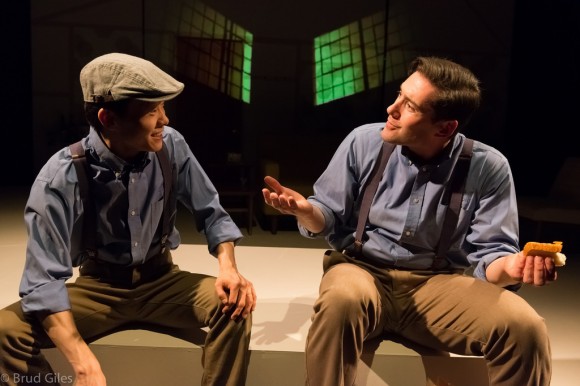Interview Part Four
 Megan Kate Ward: Can you talk about the choice to make Katha and Ryu a mixed race couple and why Japanese-American?
Megan Kate Ward: Can you talk about the choice to make Katha and Ryu a mixed race couple and why Japanese-American?
Jordan Harrison: When you are writing a play there are things that you deliberate a lot about and there are things that just appear one day and you run with it. And Ryu being Japanese-American was one of the latter. I’m sure I had an instinct that we needed something about this couple that was going to be challenging in the 50’s. If I was going to write about what it meant to impose limitations on your life, it had to be something more difficult than simply spending 7 hours making chicken stock, it had to cut straight into their lives. But that’s probably already more crafty than I was being at the time. The Japanese-American internment in WWII was a big presence on the island where I grew up near Seattle. There was a huge Japanese-American community, many of them were strawberry farmers, and many came back to the island after the internment so that was a source of shame in the community – and pride for those who had resisted that government action. And those feelings were still palpable many years later as I was growing up there.
MKW: The shift of the woman is really interesting to me. The shift of power. And one of the things in the script that caught me early on is this speech Katha gives about prejudice.
JH: One of the trickiest things about rehearsing and performing the play is to keep track of Katha as she makes these extreme choices, to stay close to her in a way. She can’t seem like a mad woman to us – the actress has to make it feel like a continuous journey, outrageous but somehow truthful. But those tricky moments of moral discomfort are some of the most satisfying for me. Like the scene where Katha and Ryu talk about what it would be like to have a biracial child grow up in the SDO and they can’t say it in so many words; or the scene where he grabs her with physical force and she tells him to keep going. That moral discomfort is a flavor that I haven’t used a lot in the past. There’s a play writing adage – or maybe just a writer’s adage – that you have to write as if your parents are dead. And those were a few moments like that for me. Moments that would make my sensitive, liberal, conscientious parents raise their eyebrows.
MKW: Those moments ring for me as well. I keep coming back to the idea of “giving up one freedom for a different type of freedom; the limitations, you’ll find that it’s a relief.” It feels weird to say out loud but it rings super true. And I’m really excited to work on that with the actors.
JH: You’re not tasked with convincing the audience to move to the SDO, they just have to believe that someone would do it. That Katha and Ryu would do it.
MKW: And that was a big question for me in the interview process with CoHo. They were asking about Katha’s emotional journey. How do we get there? How do we believe that she would make this choice? How does she go from losing a baby to moving to a 1950’s commune? Why wasn’t the option to move to Nyack or somewhere upstate enough for her? And to me Nyack wasn’t a big enough difference; she wanted to join a place where she had room to grow, where her soul could become this woman she wasn’t able to be in present day.
JH: Her dream is not to go retire and have kids in Nyack. The irony of her journey in the second act is she ostensibly becomes a housewife making pigs in a blanket, but actually she becomes more powerful than she was in 2014. Nyack wouldn’t have given her that.
Read Part One, Part Two, Part Three
[hr]
[fblike url=”https://www.facebook.com/CoHoProductions” style=”button_count” showfaces=”false” width=”450″ verb=”like” font=”arial”]
Like what you hear? Come see the show- Get your tickets here!

